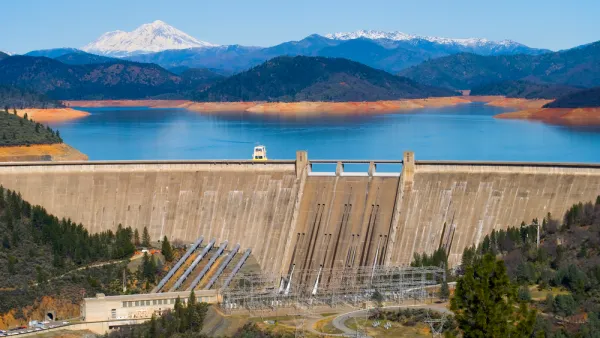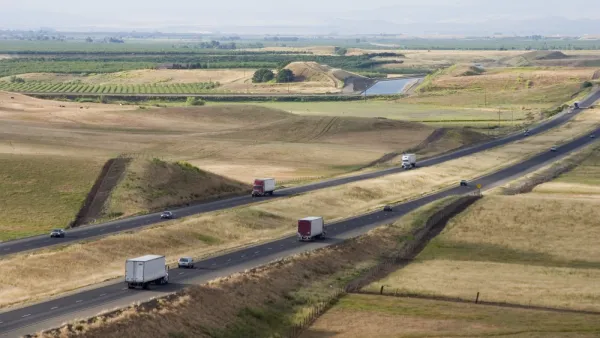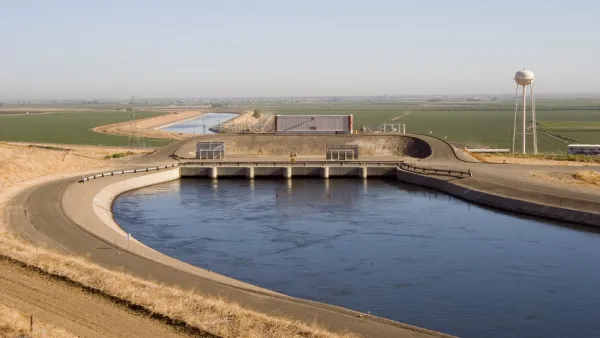Laura Bliss provides a summary of the controversy surrounding plans to bring the "Slide the City" event to Temple Avenue in Downtown Los Angeles.
Slide the City is based on the "Park and Slide" idea first implemented by Bristol in the United Kingdom. According to Bliss, an online petition to nix the idea for drought-stricken Los Angeles gathered 10,713 signatures and a related hashtag, #droughtshaming, provided a vessel for the message to reach a wider audience of the water conservation-minded public.
As explained by Bliss, however, some in the media are pushing back on the droughtshaming meme, citing such relevant data as the 20,000 gallons of drinking water the event would have used—a precious amount of water to be sure, but also the same amount of water that evaporates from a single Los Angeles pool every year.
And while those pools are the property of private owners, this event would have taken place in public. Bliss cites Jon Christenson to make the point about the cost of sacrificing events such as Slide the City:
Jon Christensen, Editor of Boom, told KCRW that Slide The City reminded him of Ciclavia's community-building bike interventions. "We should be really careful about being perceived as against fun when we're talking about water conservation," he said. "If that message gets confused, we're in trouble." And, in an ever-hotter L.A., these sorts of questions will continue to be important long after Slide The City is over.
"To live well and pleasantly, we are going to need places to cool off, where we can gather socially and have fun and build community," he said. "Maybe it would be a good idea to lose some of the thousands of private pools instead, and build more public pools."
The event was eventually canceled, despite negotiations to recycle the water in nearby Griffith Park. Adrian Glick Kudler of Curbed LA reports on the final development in the defunct Slide the City proposal.
FULL STORY: In Los Angeles, Can #Droughtshaming Go Too Far?

National Parks Layoffs Will Cause Communities to Lose Billions
Thousands of essential park workers were laid off this week, just before the busy spring break season.

Retro-silient?: America’s First “Eco-burb,” The Woodlands Turns 50
A master-planned community north of Houston offers lessons on green infrastructure and resilient design, but falls short of its founder’s lofty affordability and walkability goals.

Delivering for America Plan Will Downgrade Mail Service in at Least 49.5 Percent of Zip Codes
Republican and Democrat lawmakers criticize the plan for its disproportionate negative impact on rural communities.

Test News Post 1
This is a summary

Test News Headline 46
Test for the image on the front page.

Balancing Bombs and Butterflies: How the National Guard Protects a Rare Species
The National Guard at Fort Indiantown Gap uses GIS technology and land management strategies to balance military training with conservation efforts, ensuring the survival of the rare eastern regal fritillary butterfly.
Urban Design for Planners 1: Software Tools
This six-course series explores essential urban design concepts using open source software and equips planners with the tools they need to participate fully in the urban design process.
Planning for Universal Design
Learn the tools for implementing Universal Design in planning regulations.
EMC Planning Group, Inc.
Planetizen
Planetizen
Mpact (formerly Rail~Volution)
Great Falls Development Authority, Inc.
HUDs Office of Policy Development and Research
NYU Wagner Graduate School of Public Service





























